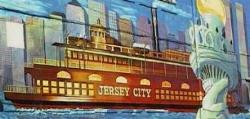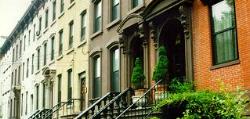 |  |  |
|
| ||
 |  |  |
 |  |  |
|
| ||
 |  |  |

 |
 |

Originally published in 1939
Some of this information may no longer be current and in that case is presented for historical interest only.
Edited by GET NJ, COPYRIGHT 2002
| 1524 | Giovanni da Verrazano, commissioned by Francis I, King of France, coasts along the New Jersey shore and possibly lands on the Jersey side of upper New York Bay. |
| 1609 | Henry Hudson sails along New Jersey coast, and ascends the Hudson River to the head of navigation. |
| c.1618 | Dutch trading post established at Bergen (Jersey City). |
| 1623 | Fort Nassau built by Dutch on Delaware River, near Gloucester, N. J. |
| 1629 | Michael Pauw obtains grant of present-day Jersey City, first re- corded land transfer. |
|
| Michael Pauw surrenders his grant. |
| 1638 | Swedish settlers enter Delaware Bay. |
| 1640 | Swedes purchase land from Cape May to Raccoon Creek from Indians. |
| 1642 | First brewery built at Hoboken. |
| 1655 | Dutch under Stuyvesant overthrow Swedish rule on the Delaware. |
| 1661 | Dutch court opened at Bergen. |
| 1662 | First school and church established at Bergen. |
| 1664 | Dutch surrender New Netherland (New York and New Jersey) to English. Col. Richard Nicolls takes possession for the Duke of York. Duke of York grants the New Jersey area to Lord Berkeley and Sir George Carteret. |
| 1665 | Gov. Philip Carteret makes Elizabethtown seat of first English government of New Jersey. |
| 1666 | Newark settled by 30 families from Connecticut. |
| 1668 | First meeting of assembly at Elizabethtown. Bergen chartered. Grant of 276 acres is issued for Hoboken. |
| 1672 | First Quaker meeting house built at Shrewsbury. |
|
1673-74 | Dutch naval force reestablishes Dutch rule; but vacates in 1674. |
| 1674 | Berkeley sells his half of New Jersey to John Fenwick in trust for Edward Byllynge. |
| 1675 | John Fenwick founds Salem, first Quaker settlement in West Jersey. |
| 1676 | Byllynge interest placed in trust with William Penn and others. Boundary between East and West Jersey defined by deed. Earliest recorded iron works founded at Shrewsbury. |
| 1677 | Burlington settled by Quakers from Yorkshire and London; named West Jersey capital in 1681. |
| 1679 | First settlement in vicinity of Trenton. Sir George Carteret dies. |
|
| Richard Arnold and William Cooper settle at Cooper's Ferry (Camden). |
| 1682 | Governor Philip Carteret dies. Mark Newbie opens Colonies' first bank of issue at Gloucester, distributing Irish halfpence. William Penn, and 11 associates, buy East Jersey from the Carteret heirs. |
| 1683 | Perth Town (Perth Amboy) is platted, to become East Jersey's
capital. First tavern in the Jerseys is opened at Woodbridge. |
| 1687 | Edward Byllynge, chief proprietor of West Jersey, dies; his proprietary interest is acquired by Dr. Daniel Coxe, of London. |
| 1688 | First pottery established by Dr. Coxe at Burlington. |
| 1690 | Robert Barclay, a proprietor and life governor of East Jersey, dies |
|
Return To |
|

|